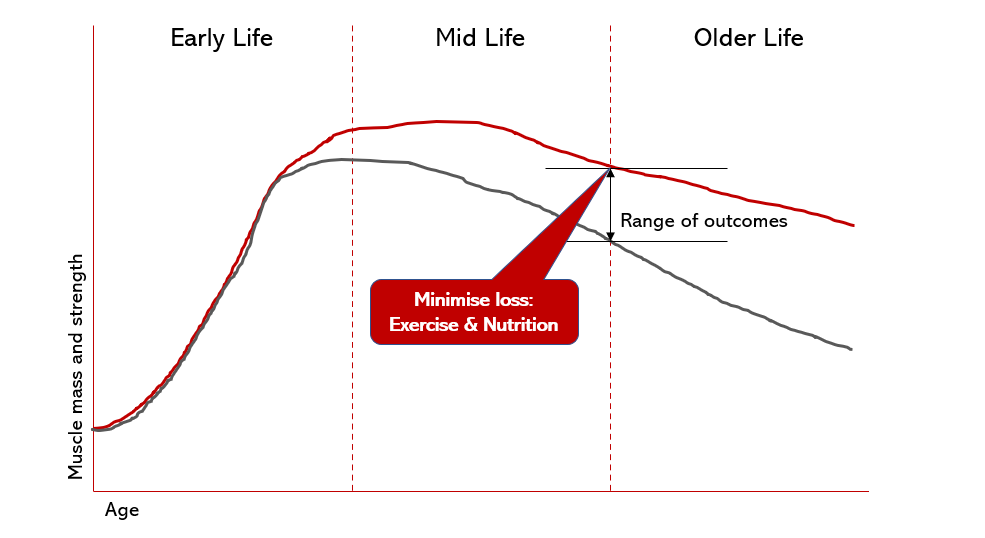Sarcopenia. Read. Your muscle depends on it.
Sarcopenia is the progressive involuntary loss of muscle and function in the body. Not pretty, but you need to read about it somewhere and how to avoid it.
Sarcopenia is a muscle disease. Starting from the age of 30 and resulting in muscle loss of around 3% - 5% each decade. Even in active men. Sarcopenia speeds up in your sixties and turbocharges in your seventies. This can be as high as 10% - 15% in leg strength, increasing to 25% - 40% after 70 years of age.
Driven by sarcopenia, by the age of 50 you could 6% - 10% down on muscle mass, even more in the legs, and growing.
Got your attention?
Not great news for old bulls and it gets worse as you age. Avoiding Sarcopenia means avoiding longer term care and mobility issues with the real risks coming in later in life due to falls etc.
Sarcopenia is a major factor in the development of frailty, which will affect your quality of life.
The range of outcomes

Key drivers in the decline.
- Age related declines in hormones e.g. testosterone and human growth hormone all contribute to the maintenance and rebuilding of muscle. These hormones drop, so does muscle mass.
- Insulin resistance results in visceral fat mass
- Declines in the neurons in spinal cord, results in reduced function, which underlies reduced muscle strength, size and mass.
Early signs?
- Do you battle to get out of the car?
- Can you stand up quickly from where you watch TV, then sit down, and then0 stand up again?
- Have difficulty in lifting, or carrying weights? Can't lift what you used to?
- Difficulty climbing stairs?
Check out a questionnaire from ResearchGate here. Many Australians are not familiar with Sarcopenia, but it is real, it can make you weaker, affect your quality of life, and as such you might want to intervene and take active steps to avoid it as soon as possible.
Sarcopenia related studies.
The importance of diet for muscle health has gained attention in ageing, as it relates to Sarcopenia. Is diet a modifiable factor to avoid Sarcopenia?
The study found that it is, and that on average a lower risk of sarcopenia is associated with healthier diets. Read the research on NCBI here.
3 ways to beat the outcomes gap.
- Physical exercise including resistance training.
- Healthy diet paired with protein.
- Weight management.

Strength training is an effective intervention for improving strength, muscle mass and quality, and delaying the onset of sarcopenia.
Sex and genetics will impact the response to strength training but unless you have been advised against strength training by a medical professional with knowledge of your case you really should just get on with it. Ensure you maintain a physically active lifestyle.
Protein. Muscles need protein. Check your daily protein intake and supplement if you need to. Check out how much protein to use here, and specifically learn about leucine, an amino acid in protein to help you synthesize muscle and stay stronger for longer. Our Old Bull protein is high in leucine.
Diet and nutrition, eat a healthy diet rich in high quality proteins, and actively manage your weight.
Medical intervention through hormone treatment and supplementation, but this will require a visit to your doctor and adequate diagnosis.
Screening. Get your annual health check done with GP and be upfront about changes in health.
Stay strong and read more on exercise and mindset on the Old Bull Health blog with our health and performance coach Donny Singe.



